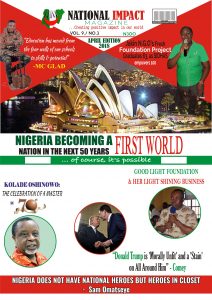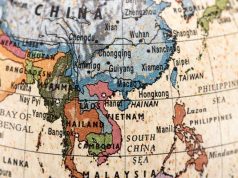
Superpower or first world nations is a term used to describe a state with a dominant position, which is characterized by its extensive ability to exert influence or project power on a global scale. This is done through the combined-means of economic, military, technological and cultural strength, as well as diplomatic and soft power influence. The term was first used in 1944 post World War II to describe powerful nations like the British Empire, the United States and the Soviet Union. A fundamental characteristic that is consistent with all the superpowers is a nation or state that has mastered the seven dimensions of state power: geography, population, economy, resources, military, diplomatic, national identify and cultural (strategy or universal ideology).

Historians have also tried to associate this term to older influential states as superpowers focusing on various superlative traits exhibited by them, Examples of these ancient or historical superpowers include Ancient Egypt which is in North Africa. But as you know the status of super power is not the birth right of any nation. Nations rise and nations fall based on what they do in relation to the mastering of the seven dimensions of state power as stated above. A nation like the United Kingdom diminished in status as a superpower greatly after the end of World War II and the Suez Crisis in 1956, the end of the Cold War and the dissolution of the Soviet Union in 1991, only the United States appeared to fulfill the criteria of being a world superpower.
Taking the united state as a stable benchmark, can Nigeria that is presently acclaimed the giant of Africa boldly throw itself to the ring to be a world influencer in the next 50 years looking out the seven dimensions of state power. I don’t think is being too ambitious because when you examine the economic trajectory of some countries between 1960 and 2016 it suggests that it can take about 25 years to turn a nation from Third World to First World. Take a look at Asia nations like Singapore, china, a remarkable record of high and sustained economic growth has been achieved from 1965 to 1990. The economic strategies of successful countries were influenced by leaders who were committed to rapid development. They had a focus on growing human capital. This in turn led to increased productivity, increased household incomes and an improvement in the general standard of living. Lee Kwan Yew calls to mind when talking of such a leader who popularized the idea of moving from Third World to First World in one generation. Some of these Asian countries like Japan, Taiwan and South Korea had no mineral wealth. What they have instead, are national systems of innovation and critically, they invested in human capital. They copied technologies from First World economies until they were on par and even overtook the First World countries. In many cases they started off equal or lower in GDP per capita when compared with a number of African countries. For example, in 1957 Ghana and South Korea had about the same per capita GDP. South Korea had a national leadership focused on the development of state institutions that were focused on rapid, technology-intensive economic development. Ghana has no programmers’ of similar nature on record.
Taking a case study of the UNITED STATES one in Best Countries: Power, 8 in Best Countries, POPULATION 323.1 million, National budget for 2018 Total expenditures: $4.094 trillion (requested), GDP $18624.48 billion (2016), education budget 65,626 billion (2018) , Defense budget-$621,696 billion, agriculture $139,676billion, Active military frontline personnel -1,400,000, GDP PER CAPITA, PPP $57,608.
5. NIGERIA population 180 million, #7.44 trillion (2017), GDP $405.10 billion, defense budget of about #87 billion, with 3.5 million people reaching the military service every year, Education budget #1 billion,
From the above analysis with Nigeria GDP at $405.10 billion, it will take about 46 years to accumulate one year GDP of the united state of about $18624.48 billion (2016). If Nigeria will be consistent and judicious in savings but we should know that there is always a place for growth if only we can apply our selves to it. There is no magic in building a great nation. Studies have shown that nations that made serious economic progress focused on growing the average income of their citizens through state interventions. Asia and Europe were seen as a key strategic tool to stimulate and guide development without impeding the private sector.
Another key area of focus among the Asian Tigers has been investment in their youth. But the youth need education to be academically and technically ready to explore the boundaries of knowledge and technology for their own benefit and that of their countries. Nigeria should exploit the youths’ dividend; it’s the most important natural resources. The Asian Tigers also have a national innovation system that links government, well-funded research and development institutions such as the universities and industries. Taiwan boasts of 21 research institutes, some covering the most advanced technologies like nano-technologies. These efforts arguably will bear fruit in the transition to First World status. Very few nations prosper without well-organized and strategically focused hard work and sacrifice. IF YOU HAVE FOLLOWED THIS ATICLE CLOSELY YOU WILL UNDERSTAND THAT THE DIFFERENCE BETWEEN GREAT NATIONS AND UNDERDEVELOPED NATIONS IS “CULTURE” PUT IT IN SIMPLICITY, THE CAPACITY TO CONCEIVE, ENACT, AND ENFORCE A PRODUCTIVE WAYS OF LIFE. CULTURE AND SYSTEMS DETERMINES HOW FAR YOU GO. For Nigeria to progress, her citizens must learn how to direct their effort and resources through the right cultures and systems with a long-term goal. And with emphasis I REPEAT AGAIN “LEADERSHIP IS KEY AND AT THE CENTER OF ALL ACHIEVEMENT IN ANY GIVING SOCIETY. Thanks for staying tuned with me.










